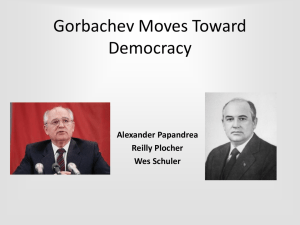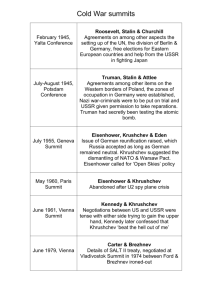POLITICAL SCIENCE 57
advertisement
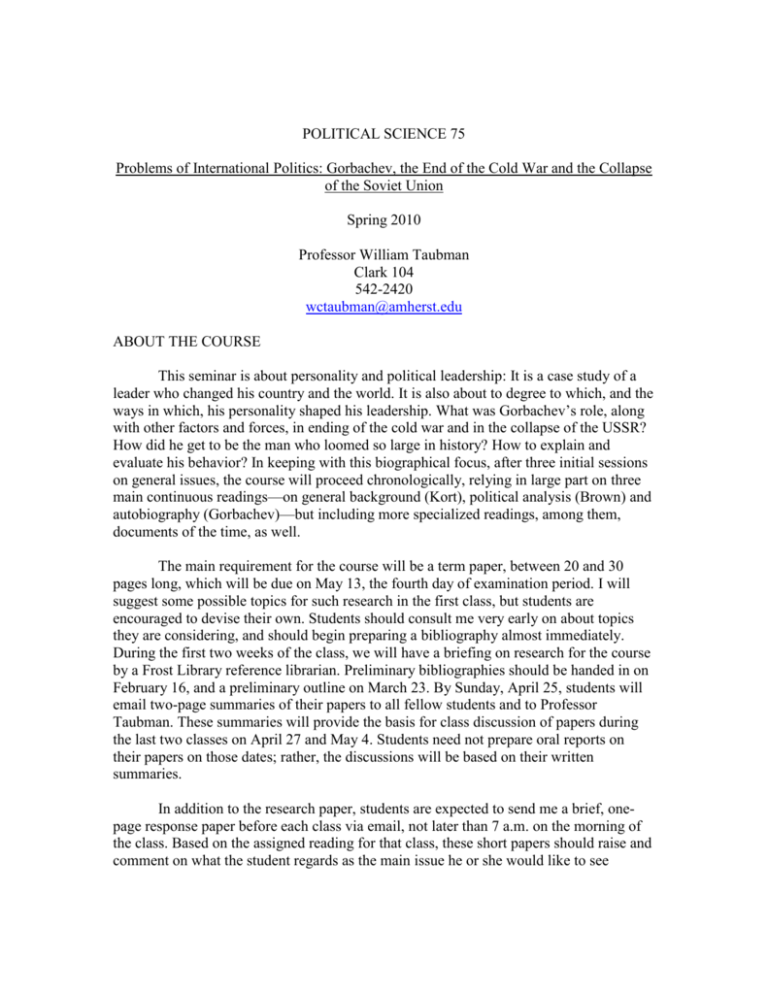
POLITICAL SCIENCE 75 Problems of International Politics: Gorbachev, the End of the Cold War and the Collapse of the Soviet Union Spring 2010 Professor William Taubman Clark 104 542-2420 wctaubman@amherst.edu ABOUT THE COURSE This seminar is about personality and political leadership: It is a case study of a leader who changed his country and the world. It is also about to degree to which, and the ways in which, his personality shaped his leadership. What was Gorbachev’s role, along with other factors and forces, in ending of the cold war and in the collapse of the USSR? How did he get to be the man who loomed so large in history? How to explain and evaluate his behavior? In keeping with this biographical focus, after three initial sessions on general issues, the course will proceed chronologically, relying in large part on three main continuous readings—on general background (Kort), political analysis (Brown) and autobiography (Gorbachev)—but including more specialized readings, among them, documents of the time, as well. The main requirement for the course will be a term paper, between 20 and 30 pages long, which will be due on May 13, the fourth day of examination period. I will suggest some possible topics for such research in the first class, but students are encouraged to devise their own. Students should consult me very early on about topics they are considering, and should begin preparing a bibliography almost immediately. During the first two weeks of the class, we will have a briefing on research for the course by a Frost Library reference librarian. Preliminary bibliographies should be handed in on February 16, and a preliminary outline on March 23. By Sunday, April 25, students will email two-page summaries of their papers to all fellow students and to Professor Taubman. These summaries will provide the basis for class discussion of papers during the last two classes on April 27 and May 4. Students need not prepare oral reports on their papers on those dates; rather, the discussions will be based on their written summaries. In addition to the research paper, students are expected to send me a brief, onepage response paper before each class via email, not later than 7 a.m. on the morning of the class. Based on the assigned reading for that class, these short papers should raise and comment on what the student regards as the main issue he or she would like to see discussed in class that day. I will take account of these comments in planning our discussions and will call on students to voice their views during the conversation in class. Because this will be an intensive course that meets only once a week, attendance at all meetings is required. Grades will be based primarily on the term paper, but faithful submission of all response papers, and participation in classes will also be taken into account. BOOKS, ETC. Richard Herrmann and Richard Ned Lebow, eds., Ending the Cold War: Interpretations, Causation and the Study of International Relations, Palgrave Macmillan, 2004 (P) Michael Kort, The Soviet Colossus, 6th edition, M. E. Sharpe, 2005 (P) Archie Brown, The Gorbachev Factor, Oxford University Press, 1997 (P) Anatoly Chernyaev, My Six Years with Gorbachev, Penn State Press, 2000 (P) Books marked (P) are available for purchase at Amherst Books. Readings marked (M) constitute a multilith packet available for purchase at the Political Science Department. Readings marked (R) are on Reserve at Frost Library. PLEASE NOTE that Gorbachev’s Memoirs and Levesque’s The Enigma of 1989 are special cases. Ordinarily, they would be available for purchase, but since they are out of print, with only a handful of used copies available at Amazon, Frost Library has purchased more than usual number of multiple copies of each and placed them on Reserve. Since large sections of these books are assigned, you are STRONGLY URGED to read them early each week, rather than waiting until the last moment when they are unlikely to be available. COURSE OUTLINE AND ASSIGNED READINGS 1. INTRODUCTION (Tuesday, January 26) 2. EXPLAINING THE COLD WAR’S END (February 2) Richard Herrman and Richard Ned Lebow, “What Was the Cold War and Why Did it End?” in Richard Herrmann and Richard Ned Lebow, eds., Ending the Cold War: Interpretations, Causation and the Study of International Relations, pp. 1-27 (P) Archie Brown, “Gorbachev and the End of the Cold War,” in Herrmann and Lebow, Ending the Cold War, pp. 31-32, 37-57 (P) George W. Breslauer and Richard Ned Lebow, “Leadership and the End of the Cold War: A Counterfactual Thought Experiment,” in Herrmann and Lebow, Ending the Cold War, pp. 161-188 (P) Vladislav M. Zubok, “Gorbachev and the End of the Cold War: Different Perspectives on the Historical Personality,” in William C. Wohlforth, ed., Cold War End Game: Oral History, Analysis, Debates, pp. 207-241 (M) 3. EXPLAINING THE COLLAPSE OF THE SOVIET UNION (February 9) G. G. Vodolazov, “Gorbachev: A Nomenklatura Utopia,” Russian Studies in History, Spring 2004, pp. 80-87 (M) Archie Brown, The Gorbachev Factor, pp. 1-17 (P) Stephen F. Cohen, “Was the Soviet System Reformable? Slavic Review, fall 2004, pp. 459-488 (M) Archie Brown, “Reform of the System or Systematic Transformation?” Slavic Review, fall 2004, pp. 489-504 (M) 4. EXPLAINING PERSONALITY (Tuesday, February 16) Fred Greenstein, Personality and Politics, pp. 27, 33-68 (M) Calvin S. Hall and Gardner Lindzey, Theories of Personality, Chapter 2 (R) Jess Feist and Gregory J. Feist, Theories of Personality, Chapters 4 and 6 (R) Dan P. McAdams, The Person pp. 354-358 (R) Jerrold M. Post, ed., The Psychological Assessment of Political Leadership, pp. 69-104 (M) 5. UNDER STALINISM: 1931-1955 (February 23) Michael Kort, The Soviet Colossus, chapters 13-15 (P) Brown, The Gorbachev Factor, pp. 24-36 (P) Mikhail Gorbachev, Memoirs, chapters 2-3 (R) Raisa Gorbachev, I Hope, pp. 41-74 (M) 6. FROM THE THAW TO STAGNATION: 1955-1978 (March 2) Kort, The Soviet Colossus, pp. 261-312 (P) Brown, The Gorbachev Factor, pp. 36-52 (P) Gorbachev, Memoirs, chapters 4-6 (R) Raisa Gorbachev, I Hope, pp. 75-119 (M) Robert English, Russia and the Idea of the West, pp. 60-114 (R) 7. ON THE EVE: 1978-1985 (March 9) Kort, The Soviet Colossus, pp. 313-329 (P) Brown, The Gorbachev Factor, pp. 53-88 (P) Gorbachev, Memoirs, chapters 1, 6-8 (R) Anatoly Chernyaev, My Six Years with Gorbachev, pp. 3-22 (P) 8. PERESTROIKA: 1985-1988 (March 23) Kort, The Soviet Colossus, pp. 333-361 (R) Brown, The Gorbachev Factor, pp. 89-179 (P) Gorbachev, Memoirs, chapters 9-12 (R) Chernyaev, My Six Years with Gorbachev, pp. 24-133 (P) NOTE: Concentrate on coverage of domestic politics. Later you will be asked to read through these chapters again with a focus on foreign affairs. “Session of the Politburo of the CC CPSU, 11 March 1985” (M) “Session of the Politburo of the CC CPSU, 4 April 1985” (M) Alexander Yakovlev, “Memorandum to Mikhail Gorbachev: ‘The Priority of Political Development,” December 25, 1985 [Excerpt]” (M) 9. DEMOKRATIZATSIIA: 1988-1990 (March 30) Kort, The Soviet Colossus, pp. 361-374 (P) Brown, The Gorbachev Factor, pp. 172-211 (P) Gorbachev, Memoirs, chapters 13-17 (R) Chernyaev, My Six Years with Gorbachev, pp. 134-295 (P) NOTE: Again, please focus on the coverage of domestic issues. 10. COLLAPSE: 1991 (April 6) Kort, The Soviet Colossus, pp. 375-384 (P) Brown, The Gorbachev Factor, pp. 252-305 (P) Gorbachev, Memoirs, chapter 27-32 (R) Chernyaev, My Six Years with Gorbachev, pp. 297-399 (P) 11. FOREIGN POLICY, I: EAST-WEST RELATIONS (April 13) Brown, The Gorbachev Factor, pp. 212-247 (P) Gorbachev, Memoirs, chapters 18-20, 23-25 (R) Chernyaev, My Six Years with Gorbachev, Reread previously read pages in Chernyaev, this time focusing on foreign affairs. 12. FOREIGN POLICY, II: THE LIBERATION OF EASTERN EUROPE (April 20) Gorbachev, Memoirs, chapters 21-22 (R) Jacques Levesque, The Enigma of 1989: The USSR and the Liberation of Eastern Europe, pp. 37-258 (R) “Memorandum to Alexander Yakovlev from the Bogomolov Commission (Maria Sylvanskaya), February 1989,” in Cold War International History Project Bulletin, #12/13, Fall/Winter 2001, pp. 52-61 (M) “Memorandum from the International Department of the Central Committee of the CPSU to Alexander Yakovlev, February 1989,” in Cold War International History Project Bulletin, #12-13, Fall/Winter 2001, pp. 62-68 (M) 13. REPORTS ON PAPERS, I (April 27) Term paper summaries to be read. 14. REPORTS ON PAPERS, II (May 4) Term paper summaries to be read.
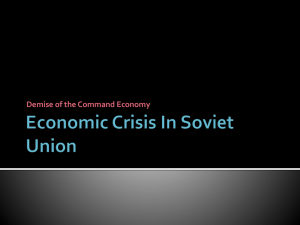
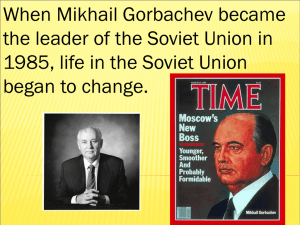
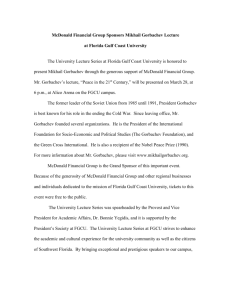
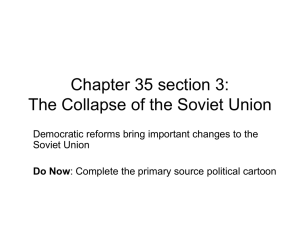
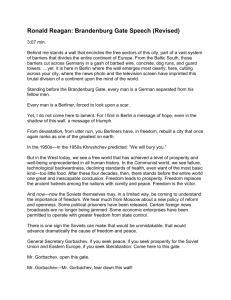
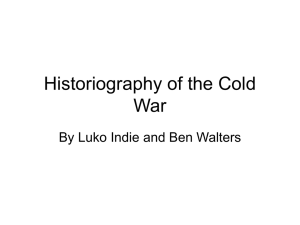
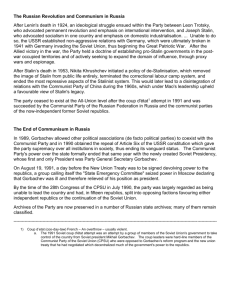
![The_End_of_the_Cold_War[1]](http://s2.studylib.net/store/data/005216723_1-d7985d2049f1fbeae49e8feeba5d6d3b-300x300.png)
